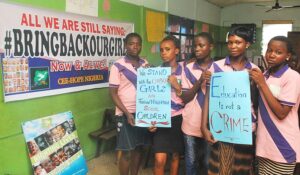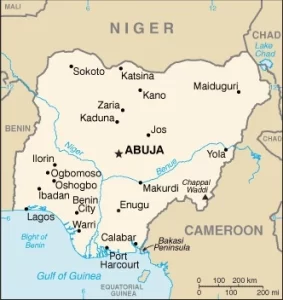Nigeria
Where
Nigeria, the most populous country in Africa, is bordered by the Gulf of Guinea, Benin, Cameroon, Chad, and Niger.[1] It is the richest country in Africa due to its petroleum resources, most of which are owned by multinational corporations such as Shell. These corporations have degraded the environment along Nigeria’s coastline with oil spills, gas flaring, and intrusive extraction.[2] Local communities have not been compensated for this destruction, and Nigerian civilians rarely see the profits of oil extraction. Government corruption and mismanagement has squandered much of Nigeria’s oil revenue.[3]
The country has faced longstanding ethnic, political, and religious divides. Today, Nigeria’s rapidly- growing population is experiencing severe effects of climate change: fertile lands are shrinking; droughts and floods are more frequent and longer; and clean water sources are increasingly scarce.[4] In 2024, Nigeria over 3 million persons are internally displaced because of conflict and climate crises.[5]
What
Boko Haram
Boko Haram, which translates to “Western education is forbidden,” is a jihadist terrorist group that operates in northeastern Nigeria.[6] They launched large-scale military operations against Nigeria’s National Security Forces (NSF) in 2009. Boko Haram-related violence peaked in 2014 and 2015. Since then, the NSF has pushed Boko Haram out of several territories.[7] Military conflict is now largely confined to the Borno Province on Nigeria’s northeastern border but the group also operates across the borders in Niger, Chad, and Cameroon. One of the strategies often used by Boko Haram is to abduct and execute people who refuse to conform to their radical brand of Islam.[8]
Fulani Herders
Muslim Fulani herders, an ethnic group spread across West Africa including in Nigeria, and Christian farmers coexisted peacefully for centuries in Nigeria’s Middle Belt, the transitional zone between the majority-Muslim north and the majority-Christian south. In the early 2000s, the region’s population was growing and arable land was shrinking due to drought-induced desertification.[9] Conflict emerged between herders and farming communities over access to increasingly limited grazing pastures and water sources. Islamist extremism in the region also heightened anti-Christian sentiments among Fulani Muslims, overlaying resource competition with identity issues.[10]
This tension escalated into widespread violence in 2015. Fulani militias carried out deadly attacks on Christian farmers in central Nigeria, with militias arriving heavily-armed and massacring entire villages.[11] The attacks led to some retaliation by Christian villagers, but the violence remains highly asymmetrical.[12]

Students protest against the Chibok kidnapping. Image courtesy of CEE-HOPE NIGERIA is cropped and licensed under CC BY-SA 4.0.
How
Boko Haram
Boko Haram’s crimes of murder, abduction, rape, sexual slavery, torture, and more have been extensively documented by the media and governments.[13] Boko Haram targets political groups, local police, the military, other religious groups, and institutions of Western education. More than 37,500 people have been killed in attacks or military conflict with Boko Haram since 2011.[14] Elderly people are particularly vulnerable due to their limited mobility to flee Boko Haram-occupied territories.[15]
Boko Haram has destroyed at least 1,400 schools and has abducted thousands of schoolchildren, typically girls, who are often recruited as child soldiers, subjected to forced marriage, or sold into sexual slavery. In 2014, the kidnapping of 276 schoolgirls from the Chibok Government Girls Secondary School sparked international outrage.[16] These kidnappings fueled parents’ concern about sending their children to school, which advanced Boko Haram’s campaign to shut down Western education. Over 10.5 million Nigerian children aged 5-14, or 37% of the school-aged population, are currently not enrolled in school.[17][18]
Members of the NSF government forces have also committed atrocities. Soldiers have repeatedly failed to distinguish between terrorists and civilians when they overtake villages that are perceived as supporting Boko Haram.[19] Government troops have killed, raped, and arrested unarmed villagers. Boko Haram militants who are accused and arrested face ill treatment, torture, and extrajudicial killings by the government.[20]
Fulani Herders
In Nigeria’s Middle Belt, Christian civilians are targeted indiscriminately. Hundreds of churches have been destroyed, and religious leaders are intensely persecuted. The conflict resulted in over 7,000 deaths between 2015 and 2020.[21] The violence exacerbated poverty, internal displacement, and food shortages.[22] Disinformation on social media is often used to fuel identity-based killing.
Criminals and bandits in the region capitalize on the region’s instability, rustling cattle, raiding villages, and kidnapping civilians. This rise in criminality amplifies the climate of fear and violence.
International Response
Former Chief Prosecutor of the International Criminal Court (ICC) Ms. Fatou Bensouda conducted a preliminary examination of Boko Haram’s actions in Nigeria. In 2020, she declared there was a reasonable basis to prosecute Boko Haram and splinter groups for crimes against humanity and war crimes.[23] She noted that members of the Nigerian Security Forces have also committed atrocities. The next step towards prosecuting perpetrators is a formal investigation, which has yet to be launched. Currently, thousands of alleged Boko Haram fighters are awaiting trial in prison.[24]
In March 2024, Deputy Prosecutor Mame Mandiaye Niang of the International Criminal Court visited Nigeria. The Court announced, “The Office of the Prosecutor is giving a chance to the principle of complementarity in Nigeria, but remains committed to move forward with investigations in the absence of genuine efforts by Nigerian authorities to bridge existing impunity gaps.”[25]
The attacks by Fulani herders have featured less prominently in international news.[26] The Nigerian House of Representatives declared the atrocities a genocide in 2018, yet Christian civilians have received no additional protection from their government and no justice.[27]
The naira, Nigeria’s currency, continues to depreciate, hitting a record low in 2024. This has made humanitarian efforts more expensive and reconstruction efforts more difficult. The World Bank approved a multi-billion-dollar financial aid package in 2024 meant to support the economy, including $2.25 billion for economic reforms and to mitigate the cost-of-living crisis, a $1.57 billion financing package for the health, energy and education sectors, and $500 million focused on distribution of electric and grid failure.[28] The EU and US have both provided financial aid to Nigeria.[29][30]
Despite humanitarian aid, the humanitarian crisis in Nigeria continues. The climate crisis worsens resource scarcity and contributes to ongoing poverty and violence. Boko Haram remains a threat to the state as violent attacks continue against civilians, increasing fear and internal division.
This page was updated by Evelyn Middleton, December 2024.
References
[1] USAID (2024). Nigeria Country Profile Fact Sheet. USAID. https://www.usaid.gov/nigeria/document/nigeria-country-profile-fact-sheet#:~:text=Referred%20to%20as%20the%20%E2%80%9CGiant,under%2025%20years%20of%20age
[2] Akintoye, A. (2018, March 14). Nigeria’s Conflict is a Result of Environmental Devastation Across West Africa. The Conversation. https://theconversation.com/nigerias-conflict-is-a-result-of-environmental-devastation-across-west-africa-91694#:~:text=Nigeria%20is%20experiencing%20a%20major,the%20lives%20of%20168%20people
[3] Akintoye, A. (2020, March 26). How Oil and Water Create a Complex Conflict in the Niger Delta. The Conversation. https://theconversation.com/how-oil-and-water-create-a-complex-conflict-in-the-niger-delta-135105
[4] Human Rights Watch. (2021, April 29). Another Day of Violence Across Nigeria. Human Rights Watch. https://www.hrw.org/news/2021/04/29/another-day-violence-across-nigeria
[5] Internal Displacement Monitoring Center. (2024). Nigeria. IDMC. https://www.internal-displacement.org/countries/nigeria/
[6] Central Intelligence Agency. (n.d.). Nigeria. CIA World Factbook. https://www.cia.gov/the-world-factbook/countries/nigeria/
[7] School of Law and Public Safety. (n.d.). Nigeria’s Boko Haram: Who Are They and What Do They Want? SLPS. https://www.slps.org/cms/lib/MO01001157/Centricity/Domain/9446/Nigerias%20Boko%20Haram_%20Who%20Are%20They%20and%20What%20Do%20They%20Want_.pdf
[8] Council on Foreign Relations. (n.d.). Boko Haram in Nigeria. Council on Foreign Relations. https://www.cfr.org/global-conflict-tracker/conflict/boko-haram-nigeria
[9] International Crisis Group. (2017, September 19). Herders against Farmers: Nigeria’s Expanding Deadly Conflict. International Crisis Group. https://www.crisisgroup.org/africa/west-africa/nigeria/252-herders-against-farmers-nigerias-expanding-deadly-conflict
[10] International Crisis Group. (2017, September 19). Herders against Farmers: Nigeria’s Expanding Deadly Conflict. International Crisis Group. https://www.crisisgroup.org/africa/west-africa/nigeria/252-herders-against-farmers-nigerias-expanding-deadly-conflict
[11] Genocide Watch. (2020, September). Genocide Emergency: Nigeria – September 2020. Genocide Watch. https://d0dbb2cb-698c-4513-aa47-eba3a335e06f.filesusr.com/ugd/6311b8_a6ca0e61c5b440668a1085ce53e8aad9.pdf
[12] APPG for Freedom of Religion or Belief. (2020, June). Nigeria: Unfolding Genocide? APPG for FoRB. https://appgfreedomofreligionorbelief.org/media/200615-Nigeria-Unfolding-Genocide-Report-of-the-APPG-for-FoRB.pdf
[13] Council on Foreign Relations. (n.d.). Boko Haram in Nigeria. Council on Foreign Relations. https://www.cfr.org/global-conflict-tracker/conflict/boko-haram-nigeria
[14] Council on Foreign Relations. (n.d.). Boko Haram’s Deadly Impact. Council on Foreign Relations. https://www.cfr.org/article/boko-harams-deadly-impact
[15] Amnesty International. (2020, December). Nigeria: Older People Often an Invisible Casualty in Conflict with Boko Haram. Amnesty International. https://www.amnesty.org/en/latest/news/2020/12/nigeria-older-people-often-an-invisible-casualty-in-conflict-with-boko-haram/
[16] Council on Foreign Relations. (n.d.). Nigeria Needs to Better Protect its Schoolchildren. Council on Foreign Relations. https://www.cfr.org/blog/nigeria-needs-better-protect-its-schoolchildren
[17] UNICEF. (n.d.). Nigeria – Education. UNICEF. https://www.unicef.org/nigeria/education
[18] Sasu, D. D. (2024, August 13). Education in Nigeria – Statistics & Facts. Statista. https://www.statista.com/topics/6658/education-in-nigeria/
[19] Genocide Watch. (n.d.). Nigeria. Genocide Watch. https://www.genocidewatch.com/nigeria
[20] Amnesty International. (2018). Nigeria: Willingly Unable: ICC Preliminary Examination and Nigeria’s Failure to Address Impunity for International Crimes. Amnesty International. https://www.amnesty.org/en/documents/afr44/9481/2018/en/
[21] Brooks, Abbie (2020, July 3). Nigeria and Religious Conflict. Humanitarian Aid Relief Trust. https://www.hart-uk.org/blog/nigeria-and-religious-conflcit/
[22] Search for Common Ground. (2017, April). Past is Prologue: Criminality and Reprisal Attacks in Nigeria’s Middle Belt. Search for Common Ground. https://www.sfcg.org/wp-content/uploads/2017/04/Criminality-Reprisal-Attack_FINAL.pdf
[23] Amnesty International. (2018). Nigeria: Willingly Unable: ICC Preliminary Examination and Nigeria’s Failure to Address Impunity for International Crimes. Amnesty International. https://www.amnesty.org/en/documents/afr44/9481/2018/en/
[24] British Broadcasting Company. (2018, February). Nigeria’s Boko Haram crisis: Court frees 475 suspects. BBC. https://www.bbc.com/news/world-africa-43111860
[25] Nigeria. (n.d.). International Criminal Court. https://www.icc-cpi.int/nigeria
[26] Ochab, E. (2020, June 15). Is Genocide Happening in Nigeria as the World Turns a Blind Eye? Forbes. https://www.forbes.com/sites/ewelinaochab/2020/06/15/is-genocide-happening-in-nigeria-as-the-world-turns-a-blind-eye/?sh=70c61f8b5405
[27] APPG for Freedom of Religion or Belief. (2020, June). Nigeria: Unfolding Genocide? APPG for FoRB. https://appgfreedomofreligionorbelief.org/media/200615-Nigeria-Unfolding-Genocide-Report-of-the-APPG-for-FoRB.pdf
[28] World Bank Group. (2024, September 26). World Bank Approves New Financing for Nigeria to Improve Health Outcomes, Safety of Dams, and Irrigation Services. WBG. https://www.worldbank.org/en/news/press-release/2024/09/26/world-bank-approves-new-financing-for-nigeria-to-improve-health-outcomes-safety-of-dams-and-irrigation-services
[29] European Commission. (2024). European Civil Protection and Humanitarian Operations | Nigeria. European Commission. https://civil-protection-humanitarian-aid.ec.europa.eu/where/africa/nigeria_en?utm_source=chatgpt.com
[30] USAID. (2021, March 12). United States Announces Nearly $104 Million in Additional Humanitarian Assistance in Response to the Ongoing Crisis in Nigeria. USAID https://www.usaid.gov/news-information/press-releases/mar-12-2021-united-states-announces-nearly-104-million-additional-humanitarian?utm_source=chatgpt.com



